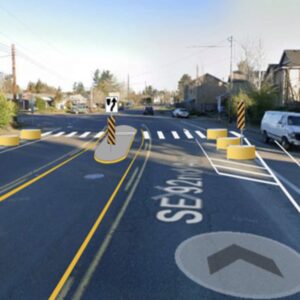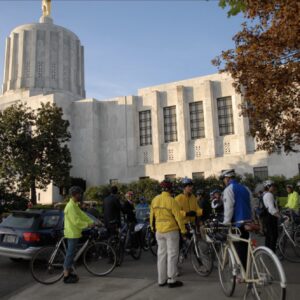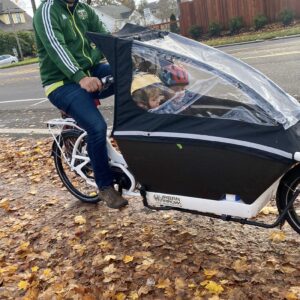On December 8th, a committee of the Oregon State Legislature will hold a public hearing on a new legislative concept* that would make significant changes in the fees and legal procedures enacted when you receive a traffic citation (or any other type of citation).
Legislative Concept 364 (LC 364, PDF here) has been in the works for over a year in the Joint Interim Committee on State Justice System Revenues. LC 364 would make changes to the fine structures used by courts and police officers, it would eliminate the guilty plea option from traffic citations, it would significantly increase maximum fine amounts, and more.
Currently, the fine amount written by police officers on a citation is significantly more than the minimum fine. When people show up to protest a citation, that amount is lowered, but remains higher than the minimum. For example, a Class C violation has a $143 minimum fine, police officers write $190 on your ticket and the actual fine that is imposed (on average) is $179. Lawmakers have taken the average fine amount doled out by judges and will now have officers write that amount on your citation. Here’s a chart provided to BikePortland by the committee:

The committee also wants to drop the “guilty” option for traffic violations because it’s redundant with the “no contest” option. Also, according to a committee memo, the guilty plea can “be a trap” and have legal consequences in subsequent civil action. Also, if you get a citation and plead “no contest” you would no longer have the option of submitting a written explanation along with your plea. Here’s an excerpt from a committee memo (PDF here) that discusses the advantages of this specific policy change:
… will result in significant administrative savings, since judge’s time will not be used to read letters submitted with the plea (often for the purpose of relative small refunds) and the court will not need to issue checks for refund amounts… could also result in a significant reduction of the number of persons who appear in court at the time indicated in the summons, since the main reason many of those persons appear is the belief that making the appearance is the only way to get a reduction of the fine based on the person’s driving record.
Under proposed language in LC 364, maximum fines for violations would increase substantially (see chart below):

The committee’s action on this major policy issue is based on a charter (PDF here) established by the 2009 passage of HB 2287.
If this concept moves forward, becomes a bill, and is eventually passed by the legislature, it would be declared an emergency and would thus go into effect in July 2011. A hearing with public testimony is planned for Wednesday December 8th in Salem.
To learn more about these potential changes, view all the background documents and more on the Joint Committee on State Justice System Revenues website. For details on the hearing, or to email your official comment about this proposal, email committee staffer Erin Seiler at erin.seiler@state.or.us.
(*Note: A “legislative concept” is just a draft of an idea for legislation. It only becomes an official bill after a legislator sponsors it and it is formally introduced.)







Thanks for reading.
BikePortland has served this community with independent community journalism since 2005. We rely on subscriptions from readers like you to survive. Your financial support is vital in keeping this valuable resource alive and well.
Please subscribe today to strengthen and expand our work.
It is interesting to see the proposal to drop the “guilty” plea option and only have “no contest.” Guilty pleas facilitate a more likely award in a civil suit if there are damages. I appreciate the concern that this is unfair to those not aware of the way the law works, but it may make civil awards a bit more challenging.
the higher fines are ok, but it doesn’t seem like the other things favor the citizen’s defense at all…
While yes the maximum fines are higher, as I read it, they only matter if a person commits several violations and a judge does not think that they have figured it out yet or are found guilty. personally, i am all for anything that makes a person who is caught speeding, talking on cell phone or otherwise driving recklessly multiple times, think twice before they do it again.
It’s about time drivers paid for the cost of enforcing the traffic laws & operating traffic courts. I’m hoping if your caught driving while suspended (DUII), you automatically have the vehicle your driving impounded and sold. There’s seems no real consequece for driving under the influence or driving while suspened.
I have heard that recent court rulings have made laws that confiscate the cars of DUII drivers very difficult to enforce. Also as against drinking and driving as I am the likes of officer Cox in Corvallis, and people who he trained who may still be arresting innocent people for DUI (he was forced to resign when 4 different people sued the city) make me a bit leery of allowing jurisdictions to balance their budgets with dui arrests.
y’all do realize that cyclists will be asked to pay the same fines, and that we already pay some of the heaviest fines in the country?
Better distinctions need to be made between classes of vehicles and classes of violations, before I’d be willing to support this.
Good point BURR – this is also a great time to weigh in on the issue. Send comments to: erin.seiler@state.or.us and your representative or senator, especially if they are on the committee.
Saving court employees and judges time will result in a significant savings to an already depleted judicial department. Usually the savvy ( repeat offenders ) take advantage of the court system as it is complicated and only understood thru repeat exposure.
Re the idea of impounding DUII cars. Impounding and selling cars is an appealing idea. It has been implemented in many places but is a process that results in a loss of money to the county due to the fact that most of these cars are junky and worth less than the administrative and storage costs incurred, Lake Oswego Municipal court would be an exception to this. Lots of studies have shown this to be true. Mandated selling of vehicles and alcohol / drug treatment is what stops people from repeat drinking and driving.
So if I neglect to put my foot down at a stop sign while riding my bicycle on an empty Sunday neighborhood street it could possibly cost me one thousand dollars?
if you fail to stop, yes… but I don’t think it’s required that you put your foot down since the sign only says to stop…
just to clarify… it’s absolutely not required to put your foot down at a stop sign while operating a bicycle. if anyone gets cited for that specific thing, please fight it and get in touch. It’s an urban myth that even some police are not well-informed about. all you are required to do is “cease forward motion”.
Yes. Regardless of Jonathan’s remarks, there have been court cases which did go against the cyclist because the cyclist did not put their foot down – it depends on the jurisdiction, the observing officer, the court, the judge, your attorney (if you have one), and other factors that may or may not have any bearing on your case. The likelihood you’d have to pay $1,000 (or pay anything at all) is pretty small – but could you be forced to? Absolutely.
Beware supporting this. I consider myself a very safe and careful driver but I recently got what I consider to be a BS speeding ticket, a photo radar ticket given out on McLaughlin Blvd just south of the Ross Island Bridge, for exceeding the 35 mph limit. This area is tantamount to a speed trap as conditions in that area are conducive to driving faster, safely, as evidenced by the fact almost everyone does. I’m now faced with a $250 ticket, one I can’t afford very readily for a BS violation. The enforcement of traffic violations needs to be seen more as a real safety mechanism, not just a revenue raising device as it’s often perceived now, for people to accept these new higher fines and changes to these administrative procedures.
I always thought that all speeding tickets were BS… however that section of 99E is currently a construction zone so the reduced speed makes sense… southbound they could increase the speed sooner, but northbound there’s 26/Powell traffic coming from a complete stop right at the bridge…
there’s plenty of warning signs about the 35 mph limit…
not all laws make sense, but we all know the penalty for disobeying them…
I received a ticket from an actual police officer in this exact area (going NB) last year.
Despite being pissed about the ticket, it was my own fault for not following the signs. They are everywhere, but I was sort of just following traffic and not paying attention to my speed (10 over), and happened to be chosen by the officer to be pulled over.
The officer was nice enough not to give me the 2x construction zone fine, however. And I “always” slow down there now.
It’s not a BS violation – that’s a constuction zone, well-posted, and regular motorists have seen the photo radar van and motorcycle units in that location for more than 2 years during the construction. It’s fairly safe for motorists to go over 35, but definitely not safe for large trucks to go that speed, and not safe for the constuction workers. An absense of fatal injuries doesn’t mean that the higher speeds are safer, it merely means that there has been some luck involved, and that the workers are being very careful.
Perhaps a simple way to address the vehicle characteristics (bikes, motorcycles, cars, trucks, and RVs) effect on the potential threat (crash and injury) would be to add a vertical column to the fine structure based on weight class?
K: your inability to obey the speed limit in a construction zone earned you a hefty fine. And you probably learned something, right?
Therefore, the increased fines (due to the construction zone) appear to have done the job they were designed to do: get you to obey the law.
Maybe increased fines as proposed, above, will also help to change some of the deplorable driving behavior we see currently.
Yeah, boy–$1000 for rolling a stop sign on my bike? Yikes! I’ve never been stopped for this before (probably because I perform what I call an “automotive stop”, i.e., slow roll-through at all stop signs), but I would really hate to be stopped for it if this concept becomes law. Seems like if the intention is to acknowledge the danger of violating traffic laws, then the fines ought to reflect the actual danger created by the offender. I would favor a weight class amendment as suggested above.
Police should be funded by tax-paying citizens, not fines. All the money received as fines or impounded property should go to the state general fund and not directly to the local police dept’s. This would decrease police corruption to raise money with tickets and drug arrests. Police should be prioritizing crime that the citizens deem most threatening to public safety and not crimes that raise the most revenue.